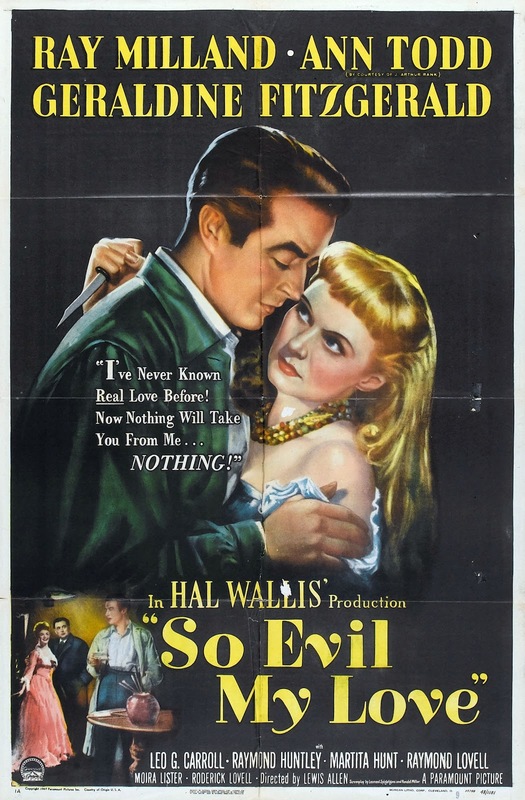The 1948 movie "So Evil My Love" tickled my brain when I happened on it on Criterion channel. There was so much plot, and the relationship between the lead characters (played by Ann Todd and Ray Milland) was both fascinating and fragmented. One couldn't help feeling that there was a lot more to the story. While the movie takes largely Milland's point of view, I couldn't help but conjure up Todd's perspective the whole time, which seemed far more interesting. The predictable moralizing common in Hays Code-era movies is kept to a minimum, delivering a tense and unusual noir.
And it turned out to be based on a crime novel, published only a year before (1947), written by Marjory Bowen under the male pseudonym Joseph Shearing and originally entitled "For Her to See." Surprisingly (not!), the novel is almost entirely told from the point of view of the female character Mrs. Sacret (changed to Mrs. Harwood in the movie), while the movie not only shifted it to the male character, a painter who calls himself Mark Bellis, but also made him much more sympathetic than he was in the novel. It was obvious that the filmmakers (the screenwriters and director were all male) needed a male anchor to this story or they wouldn't know how to handle it.
In many ways, the novel reminded me of "The Talented Mr. Ripley" by Patricia Highsmith, published just 8 years later. I wouldn't be surprised if Highsmith took inspiration from For Her to See. A key difference between these two novels --- and the element that makes this novel extremely original --- is that the main character is not a hero, not even an antihero, but rather a loser. This choice is so daring and difficult to pull off that very few writers have even attempted it. It is so much easier and more appealing for both the author and the reader to identify with a master criminal and imagine oneself to be the smartest guy in the room. It is much more difficult to enter the mind of a not-too-smart character without making it drab and boring. No part of Mrs. Sacret's limited understanding of the world around her is boring, even if I, as the reader, often know more about what's going on than her. As an unreliable narrator with poor insight into other people's motives, it is a darkly comical pleasure to see the world through the very distorted lens of her eyes and introduces a modernist uncertainty rarely seen in this genre.
In real life, the vast majority of criminals are not nearly as intelligent as the movies and thrillers want us to believe. Mrs. Sacret's motives and calculations are so petty and common that most authors have no interest in exploring them. The central similarity between her and Mr. Ripley is their resentment and envy toward their rich friends. In other words, money. Their conviction for taking money from their friends by any means necessary push the theme of class struggle very near the surface, which might be a source of discomfort for other writers. Mrs. Sacret especially is driven by a sense of grievance and entitlement that is possibly the most prevalent motivation among criminals of our time. We are startled in our recognition of this pervasive sentiment. "I deserve more. I don't have it because those people cheated me. I am wronged. I have cause to take revenge on all of you."
The psychological insight throughout the novel is refreshing because it is more astute than most thrillers and, let's not kid ourselves, literary fiction about the lives of college English professors. All of the characters are ambiguous and test the limit of our sympathy. This comes with the unreliable lens of Mrs. Sacret and makes the reading experience delightful (especially for a cynic).
Unlike the movie that centers around the male seducer/mastermind, the novel keeps him in the shadows, drawing a most chilling and irresistible psychopath rarely seen in other works but resonates with reality. The ending is really stunning in its lack of complete resolution. Even after decades of reading mysteries and crime novels, I am hard pressed to name a villain as well written as "the painter."
What I like the most about this novel, however, is how aggressive and pungent the language is. In a novel by a woman (an English one no less!), about a woman's crime, told in the woman's voice, and filled with female characters, the pages are unapologetically filled with words like "power" and "stupid" and "hate." No euphemisms, no circumlocution, no fluff. Perhaps that was why Bowen chose to publish it under one of her male pseudonyms?


No comments:
Post a Comment